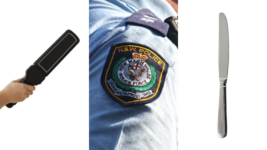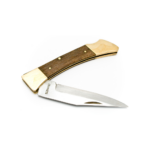NSW Police to Be Given Power to Wand Individuals Without Reasonable Suspicion

Despite a decadelong social campaign to see the warrantless encroachment of New South Wales police officers into the private space of civilians, specifically in the form of strip searches and those related to sniffer dogs, the Minns government is legislating even more reasons for officers to randomly target the public.
The newly proposed laws, which are ostensibly aimed at detecting knife offences will involve officers being able to run a metal-detecting wand over the outside of any person’s clothing who is found to be within a zone designated as an area where police can check individuals to ensure they’re not carrying a “weapon”.
These laws are necessitated, NSW premier Chris Minns and attorney general Michael Daley told the press on Tuesday, because of the recent mass murder at a Bondi Junction shopping mall, along with the nonfatal stabbing at a western Sydney church last month.
The new laws are to mimic those rolled out in Queensland last year, which has led to local police officers up there confiscating household implements, like kitchen and butchers’ knives, as well as screwdrivers.
And a law preventing the sale of knives to youths under 18 years old will too be enacted.
But what the state’s top minister and chief lawmaker neglected to mention is that power allowing police to randomly approach and search people, without even a reasonable suspicion of an offence, further marks an erosion of the protection against police randomly searching anyone they please without reason.
“Commonsense” reform
The NSW government explains that the wanding law will be modelled upon the 2023 Queensland law, and it will allows officers to randomly wand people in designated zones, which must be a place where a knife crime has occurred within the last six months, for 12 hours periods.
The yet-to-be introduced legislation will also prohibit the sale of knives to people under 18, unless the individual needs one for work or study, which replaces a current ban on sales to those under 16. And the penalties faced by retailers who continue to sell knives to youths will be increased.
The Queensland law, which is known as Jack’s Law, was passed in March 2023, to allow “police officers to utilise a metal detecting wand in operations in all safe night precincts”, which are areas now given extra late-night police attention, along with “public transit hubs and on public transport”.
“The only distinction between the Queensland law and the law in NSW is that in Queensland, they had existing safe knife precincts,” Minns told reporters on 7 May, “we don’t have that designation in NSW, and so, as a result, we have to craft the law, so it applies by regulation.”
This means the power will be inserted into a new section of an Act, which will also have a set of related regulations in the form of delegated legislation. And while the regular law must be debated and passed by parliament, designated legislation allows ministers to change regulations at will.
The premier considers the “most likely” areas where NSW police will be conducting wanding operations, at least in the initial stage, will be at “shopping centres, sporting precincts, train stations or areas where there are crowds that gather”.
And as the NSW Liberal Nationals have deemed the measures too soft, the laws are sure to sail through both houses of state parliament.
Eroding reasonable suspicion
NSW police has been using drug dogs in public spaces since 2001, and then searching individuals based on an indication, which, as the Ombudsman informed in 2006, results in nothing being located on 73 percent of occasions, and when something is found it’s most often a tiny amount of cannabis.
Search laws in general usually require a police officer to hold a reasonable suspicion about a person prior to searching them, their premises or their vehicle.
Indeed, reasonable suspicion is a cornerstone of the NSW criminal justice system, which is supposed to prevent law enforcement officers from randomly targeting any civilian they choose.
The legal authority on reasonable suspicion is the 2001 NSW Criminal Court of Appeal case R versus Rondo, which defines reasonable suspicion as involving less than a reasonable belief, but more than a possibility. And there should be some factual basis to the suspicion.
So, reasonable suspicion is supposed to prevent officers applying their prejudices when searching people: it is supposed to stop random searches based on ethnicity, religion, appearance, dress, location or attitude.
Basically, the provision of reasonable suspicion is to stop cops searching people they don’t like the look of.
However, whether an indication from a sniffer dog, which are known to make false indications on up to three-quarters of occasions, warrants a reasonable suspicion has long been questioned. And the decades-old-long ambiguity around this clearly constitutes an erosion of that protection.
This ability to encroach upon an individual’s personal space in public has further been dramatically increased over the last decade with the imposition of strip searches to accompany a drug dog search when a pat down hasn’t turned up anything illegal.
So, civilians are often being forced to strip off in front of two armed strangers based on an indication from a dog that is more than likely making a false indication. And these impositions, which are known to usually be fruitless, can then only be considered as an intimidatory invasion of privacy.
Removing reasonable suspicion
Now deceased Bondi Junction stabber Joe Cauchi was a 40-year-old man when he killed his six victims. And the authorities are asking us to buy the proposition that if wanding had been operating then such a tragedy could have been averted.
However, one might consider that Cauchi, or anybody so inclined for that matter, could easily pick up a knife on location at the mall, say, in the kitchen section of the David Jones department store, or if they drop into a restaurant and pick up a knife from a table.
Labor outlines that wanding is being implemented less than a year after it doubled the maximum penalties applying to knife crimes, which, obviously being in place last month, did absolutely nothing to deter Cauchi or the church stabber, who has since been dealt with under terrorism law anyway.
And the new laws are also being rolled out, on top of last year’s measures, at a time when violent knife crimes have been trending downwards over the last twenty years, with recent BOCSAR figures outlining that in 2004, there were 4,258 such incidents, while last year, this had dropped to 1,518.
During Tuesday’s presser, however, Minns and Daley didn’t make it apparent that wanding removes the protection of reasonable suspicion from the search equation, or that they’re providing officers with the ability to exercise all their prejudices unchecked when selecting people for such a search.
The NSW Council for Civil Liberties has written to the NSW attorney general, outlining that it’s concerned the expansion of powers will result in the heightened surveillance of “young people from low socioeconomic regions”, First Nations people and people experiencing homelessness.
And these concerns are well founded, as laws that do permit police discretion usually result in the prejudices the council is concerned about when assessment statistics are produced. And this is the case with police cautioning for cannabis or determining where to set up sniffer dog operations.
So, in considering this, it appears that through the imposition of drug dogs, strip searches and soon wanding, the NSW government is gradually gifting NSW police with the ability to hurdle reasonable suspicion. And not because it curbs crime, but rather to increase law enforcement reach.







